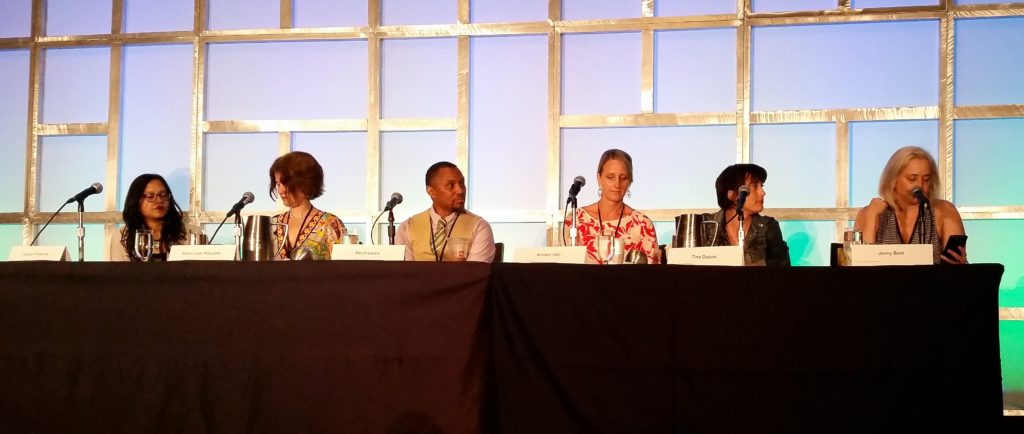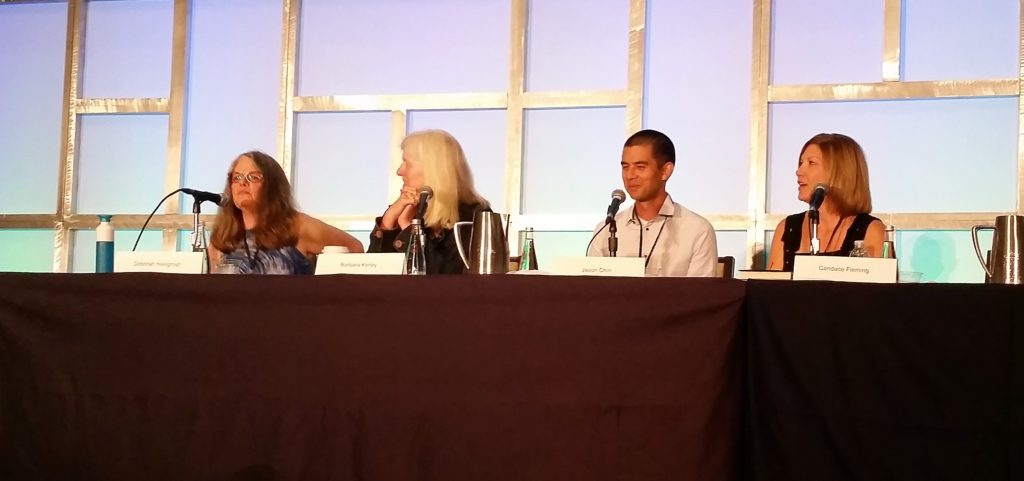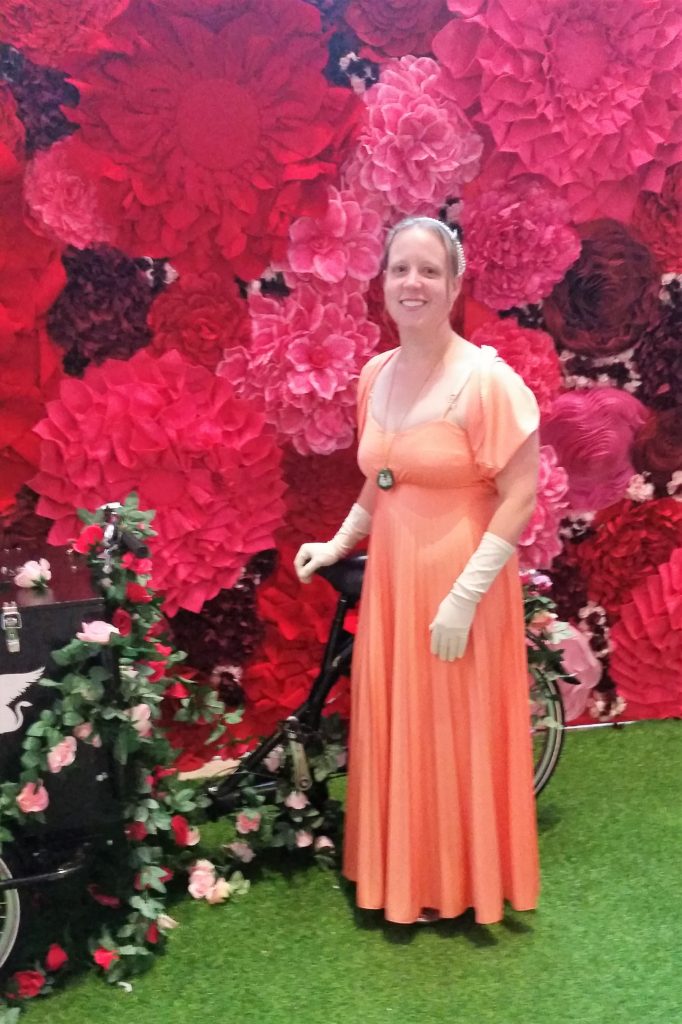Last #LA18SCBWI post was devoted to the amazing (and many!) keynotes, so this post is devoted to the panels. Where the keynotes are largely inspirational, the panels tend to get more into the nitty-gritty of publishing and the craft of writing. These are snippets from each panel, which are done in a Q&A style and often turn into conversations, so these are simple highlights I’ve pulled out and tried to keep in context as much as possible. (And make sure you get all the way to the end to see me dressed as Jane Austen!)
Editor Panel with Laura Godwin, Elizabeth Law, Amanda Maciel, Krista Marino, Francesco Sedita, and Namrata Tripathi:
Question: What makes you keep reading on when considering a manuscript?
- A pulsing heartbeat throughout the story. – Francesco Sedita (president and publisher of Penguin Workshop at Penguin Young Readers)
- You can tell when a writer has a deep investment and curiosity about a topic. She takes notice when she doesn’t care about a thing and she is transformed to care about that thing by the writing. – Namrata Tripathi (VP & publisher of Kokila, a newly-formed imprint of Penguin Young Readers dedicated to centering stories from the margins)
Question: What do you see too much or or can’t see enough of?
- It’s super exciting to see something that’s been done a million times and it’s done in a new way. – Krista Marino (senior executive editor at Delacorte Press, part of Random House Children’s Books)
Question: What is the most important skill a writer for children can possess?
- Persistence. Have passion and stay in the game. – Elizabeth Law (editor at Holiday House)
- An endless curiosity about the world and yourself. You need a great idea and to keep asking questions and developing that idea. – Amanda Maciel (executive editor at Scholastic)
- A curiosity and drive to satisfy it in an endless loop. – Laura Godwin (vice president and publisher of Godwin Books, an imprint of Macmillan publishers)
Panel “Truth vs. Innocence in Children’s Books” with Elana K. Arnold, Brandy Colbert, Erin Entrada Kelly, Carolyn Mackler, and moderated by Linda Sue Park:
Question: How go you define dark in literature?
- It’s what I have. When the well has filled us and whatever we’re filled with we have to work with. – Elana K. Arnold
- Dark is part of life. Leaning into the sadness of life, as I also lean into the the light and find humor in sadness. – Carolyn Mackler
- The further away from hope, the more interesting the road to coming back. – Erin Entrada Kelly
Question: Tell us the initial spark or kernel for one of your books.
- After my first two books, I had emptied the well of shame. New water had filled the well, and it was rage. I’m not holding back and saving anything for the next book. – Elana K. Arnold (on her upcoming book DAMSEL)
- It’s wish fulfillment in an alternate universe. – Brandy Colbert (on her book LITTLE & LION)
Question: How do you respond to critics who say your books are too dark?
- One of the greatest disservices we do to young people is to underestimate them. – Erin Entrada Kelly
- I pull out the letters from young readers to show me how important my books are to them. – Carolyn Mackler
- Children are whole people. Book are a wonderful way to practice saying no. It’s good practice to recognize when they feel uncomfortable or unsafe. – Elana K. Arnold
- I get really angry because I think of the kids going through those things. It’s telling those kids their lives or experiences are too dark. – Brandy Colbert
Panel “Culture, Identity, and Writing: Where do they intersect?” with Malinda Lo, Dashka Slater, Aida Salazar, Ibi Zoboi, and moderated by Arthur Levine:
Question: Was there a time during the writing that you felt the joyful intersection of culture, identity, and the work at hand?
- I was writing about my own identity but not my own experiences. When I was telling a complete truth, my own truth, about my culture. – Ibi Zoboi
- I was proud and joyful to rescue my story from obscurity. It’s a revolutionary act. – Aida Salazar
Question: What are the talismans of power in your writing?
- I use my writing as a tool for social change. My characters have emotions in spite of white narrative and hostility. – Aida Salazar
- Having to think of yourself and having to think about how you are being perceived by others in a white space. I always feel like I’m on the outside looking in. I can’t help but having a worldwide perspective. – Ibi Zoboi
- Using gender and race and performance. The point is to center the Chinese-ness of the character and the point isn’t to be concerned about making sure others get it. – Malinda Lo
Question: As part of a minority culture, do you ask “Is there part of me that I shouldn’t show because it will be too scary?” Do you feel that way in your writing, that you’re censoring a part of yourself?
- I definitely did. I imagined the characters in ASH as Asian. The gay thing was enough of a problem, so I did not include any Asian-ness in the book. You don’t see these stories that represent you. You have to imagine they exist in the first place. The message is everywhere, no one has to outright tell you. – Malinda Lo
- Self-censoring comes in telling the truth. It comes when we’re afraid of telling these truths and thinking about who will be mad. – Ibi Zoboi
- Authenticity is marginalizing. It centers the mythological one story line. – Malinda Lo
Agent Panel with Jenny Bent, Tina Dubois, Kirsten Hall, Kevin Lewis, Ammi-Joan Paquette, and Tanusri Prasanna, and moderated by Alexandra Penfold
 Question: What’s strong in the marketplace right now?
Question: What’s strong in the marketplace right now?
- Books addressing complicated and ugliness of our world. – Kirsten Hall
- Fiction that digs deep into the personal experience, the heart coming through in a deep way. – Ammi-Joan Paquette
Question: Should you write a book outside your own identity?
- If you want to write a book outside your culture, if it’s in your heart, then do it. But realize you have to take what comes with that. Actions have consequences. – Kevin Lewis
- Look internally. Ask yourself why you want to write this book. If you’re writing it just to be diverse, then don’t do it. If you feel it in your loins, then do it. – Tanusri Prasanna
Question: What is your best advice for writers?
- Be you and do you. Spend a lot of time on your work. – Kirsten Hall
- Take risks and do something different. – Ammi-Joan Paquette
- Celebrate any victory. Celebrate yourself. – Jenny Bent
Panel “The Secret of Crafting Engaging Non-fiction” with Jason Chin, Candace Fleming, Deborah Heiligman, and Barbara Kerly, and moderated by Melissa Stewart
- I believe people’s lives have themes. Look for things in people’s lives that has those themes. – Barbara Kerley
- A life is a story. It has a beginning, middle, and end. This is why narrative non-fiction works for biographies. – Deborah Heiligman
- The difference between fiction and non-fiction is like cake. In fiction, I get to buy the ingredients for the cake, bake it up, and gobble it down. In non-fiction, I don’t do the shopping. The ingredients are all crazy, but I still have to make delicious cake. – Candace Fleming
No L.A. conference would be complete without the Saturday night gala. This year’s theme was a tribute to writers and artists. There were tacos and dessert food trucks and dancing. I chose to go as the incomparable Jane Austen. This may or may not have been a tweet about me that night (I’m pretty sure I saw at least one other Jane Austen, but I’m not sure I saw any others dancing to this particular song), “You haven’t lived ‘till you’ve seen Jane Austen dance to Salt-N-Pepa.” @jennymontyinSD






















Thank you, Katie, for your helpful notes. They made me wish I’d been there. You’re delightful as Jane Austen. xox Donna
Donna! I miss our group so much. So nice to hear from you. xo
Look at you, fancy lady!
Thank you for the lovely distillations from the conference. I especially liked “I believe people’s lives have themes.” (Barbara Kerley.)
I’m often tempted to skip non-fiction keynotes and panels (because sometimes you just need a break and to skip something), but I’m glad I went to this one. I was particularly excited to see Deborah Heiligman, who wrote my favorite book of 2017 VINCENT AND THEO.
Katie, thank you so much for sharing these inspiring snippets. They really resonated, esp. the Erin’s comments about hope and the dark. And you are a gorgeous Jane Austen!!!
I’m glad so many of you have enjoyed the snippets. I love going back and reading my notes, but it does take some time to pick out ones and type them up for the blog. It makes it worth it to see that you all read them.
Thanks, Vijaya!
I missed you as Jane Austen. The other Jane Austen I saw was Sarah Diamond, one of the SCBWI staff.
I think I saw the other Jane Austen in passing. I spent much of the evening on the dance floor. It was a fun night! So many great costumes.